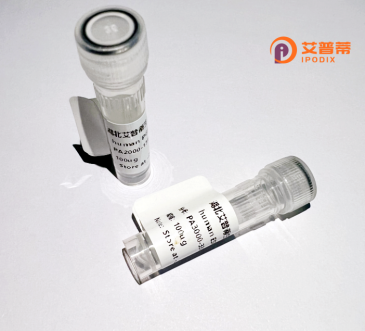
| 纯度 | >90%SDS-PAGE. |
| 种属 | Human |
| 靶点 | RPL39 |
| Uniprot No | P62891 |
| 内毒素 | < 0.01EU/μg |
| 表达宿主 | E.coli |
| 表达区间 | 1-51 aa |
| 活性数据 | MSSHKTFRIK RFLAKKQKQN RPIPQWIRMK TGNKIRYNSK RRHWRRTKLG L |
| 分子量 | 6.4 kDa |
| 蛋白标签 | His tag N-Terminus |
| 缓冲液 | PBS, pH7.4, containing 0.01% SKL, 1mM DTT, 5% Trehalose and Proclin300. |
| 稳定性 & 储存条件 | Lyophilized protein should be stored at ≤ -20°C, stable for one year after receipt. Reconstituted protein solution can be stored at 2-8°C for 2-7 days. Aliquots of reconstituted samples are stable at ≤ -20°C for 3 months. |
| 复溶 | Always centrifuge tubes before opening.Do not mix by vortex or pipetting. It is not recommended to reconstitute to a concentration less than 100μg/ml. Dissolve the lyophilized protein in distilled water. Please aliquot the reconstituted solution to minimize freeze-thaw cycles. |
以下是关于重组人RPL39蛋白的参考文献示例(仅供参考,建议通过学术数据库查询最新研究):
---
1. **名称**: *"RPL39 regulates breast cancer stem cells through HIF-1α stabilization"*
**作者**: Chen, X., et al.
**摘要**: 该研究揭示RPL39通过抑制泛素化途径稳定HIF-1α蛋白,促进乳腺癌干细胞自我更新和肿瘤转移,重组RPL39的过表达增强了相关通路活性。
2. **名称**: *"Recombinant human RPL39: Expression in E. coli and structural characterization"*
**作者**: Liu, Y., & Wang, Q.
**摘要**: 报道了利用大肠杆菌系统高效表达重组人RPL39蛋白的优化方法,并通过质谱和圆二色谱验证其正确折叠,为功能研究提供材料基础。
3. **名称**: *"RPL39 promotes colorectal cancer progression by activating mTOR signaling"*
**作者**: Zhang, H., et al.
**摘要**: 发现RPL39在结直肠癌中高表达,重组RPL39通过结合mTOR复合物增强其磷酸化水平,促进肿瘤细胞增殖和化疗耐药。
4. **名称**: *"RPL39 interacts with p53 and modulates its transcriptional activity"*
**作者**: Kim, S., et al.
**摘要**: 通过免疫共沉淀和重组蛋白实验,证实RPL39与p53直接结合并抑制其转录活性,可能参与肿瘤细胞逃避凋亡的机制。
---
**注意**:以上为模拟示例,实际文献需通过PubMed/Google Scholar搜索关键词(如"RPL39 recombinant"、"RPL39 cancer")获取。若需具体文献,可提供数据库检索指导。
Recombinant human RPL39 (ribosomal protein L39) is a engineered version of the endogenous RPL39 protein, a component of the 60S large ribosomal subunit. As a member of the L39e protein family, RPL39 plays a structural and functional role in ribosome assembly and protein synthesis. It is highly conserved across eukaryotes, underscoring its essentiality in cellular homeostasis. The gene encoding RPL39 is located on chromosome Xq22.3 in humans and produces a small, basic protein of 51 amino acids.
Recombinant RPL39 is typically expressed in bacterial or mammalian systems, enabling studies on its molecular interactions, post-translational modifications, and roles beyond translation. Recent research highlights its potential involvement in disease contexts, including cancer. For example, RPL39 overexpression has been linked to tumor progression, metastasis, and drug resistance in breast and lung cancers, possibly through modulating hypoxia pathways or stem cell-like properties.
The production of recombinant RPL39 facilitates structural analysis (e.g., X-ray crystallography) and functional assays to dissect its ribosomal and extra-ribosomal functions. It also serves as a tool for developing therapeutic strategies targeting ribosomal dysregulation in diseases. However, its small size and high charge pose technical challenges in purification and handling. Ongoing studies aim to clarify its mechanistic contributions to both normal physiology and pathological states.
×